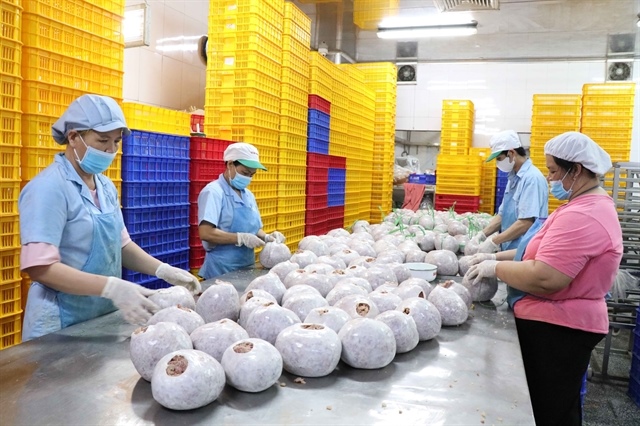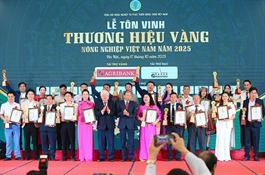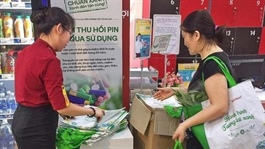Household businesses urged to embrace fintech, transition to enterprise models
Household businesses urged to embrace fintech, transition to enterprise models
From grocery store owners to rural traders, many small business operators — once hesitant about adopting technology — are now actively using digital financial services to manage transactions, reduce costs and improve efficiency.

Participants at the conference discuss opportunities for household businesses to access financial technology and drive growth.— Photo nhandan.vn |
Supporting household businesses in accessing financial technology and transitioning to formal enterprise models is emerging as a key strategy to drive economic development, improve competitiveness and boost state revenue.
Lê Quốc Minh, Editor-in-Chief of Nhân Dân (People) Newspaper and Deputy Head of the Party Central Committee’s Commission for Information and Education and Mass Mobilization, emphasised this point during a conference held in Hà Nội on Friday.
According to Minh, Việt Nam currently has over five million household businesses, accounting for around 30 per cent of the country’s GDP and providing employment for more than 10 million people.
He added that the Politburo has issued Resolution No 68, which gives priority to reviewing and improving the legal framework on individual businesses, minimising gaps and creating favourable conditions to encourage household businesses to transform into enterprises.
Dr Trần Văn, Director of the Institute for Digital Economy Development Strategy (IDS), said after nearly 40 years of innovation, Việt Nam is standing on the cusp of a significant breakthrough, driven by the ongoing scientific and technological revolution and the national digital transformation agenda.
Previously, only large enterprises with capital and resources could digitalise their production and business operations. Today, even small, individual household businesses, including those in remote, isolated and disadvantaged areas, can access these opportunities through smart financial technology platforms, Văn said.
From grocery store owners to rural traders, many small business operators — once hesitant about adopting technology — are now actively using digital financial services to manage transactions, reduce costs and improve efficiency.
Thanks to digital integration, many household businesses are scaling up, diversifying their offerings, improving service to customers and creating the necessary legal and financial conditions to transition into small- and medium-sized enterprises, he said.
However, the path to full digital integration is not without obstacles.
Văn noted that the legal framework has not yet caught up with the evolving business models of household enterprises. In addition, many business owners and small producers still have limited awareness and understanding of technology.
On the supply side, technology firms themselves face difficulties, including shortage of high-quality human resources and the substantial financial investment required for research and development.

Participants at the conference discuss opportunities for household businesses to access financial technology and drive growth.— Photo nhandan.vn |
According to IDS, while access to financial services has improved overall for small, micro and household businesses, progress is far from uniform.
The lowest-income individuals only saw a 6 per cent increase in account ownership over the past five years, the institute reported, highlighting persistent inequality in financial inclusion.
Despite accounting for a significant portion of the national economy, these businesses continue to face major obstacles in securing formal credit. Lack of collateral assets, high interest rates and complicated procedures remain core barriers.
The IDS said that the gap in access to financial services between income groups and business sizes is widening, with the most vulnerable groups falling further behind.
In this context, the application of technology — especially financial technology (Fintech) — has played a crucial role in expanding financial inclusion, the institute said, adding that fintech offers simple, low-cost and accessible service models tailored to the needs of low-income individuals and those without credit history. This includes e-wallet applications, non-traditional credit scoring methods and micro-savings programmes.
For his part, Dr Nguyễn Đức Kiên, Chairman of the IDS’ Scientific Council, underscored the importance of continuous policy support for emerging sectors such as Fintech. This enables financial market participants to keep learning, improving and enhancing their competitiveness.
Kiên warned that without an open-minded and proactive approach to policymaking, Việt Nam risks losing the momentum gained so far in its digital transformation efforts.
During the event, Nguyễn Quang Khải from MISA JSC highlighted Việt Nam’s move to abolish the lump-sum tax policy from January 1, 2026.
For this transition to take place smoothly, business households need to be well prepared — not only in terms of legal knowledge but also by adopting the right technological tools. This will ensure that invoicing, tax declaration and payment processes can be completed quickly, accurately and easily, Khải said.
- 20:53 17/10/2025



























